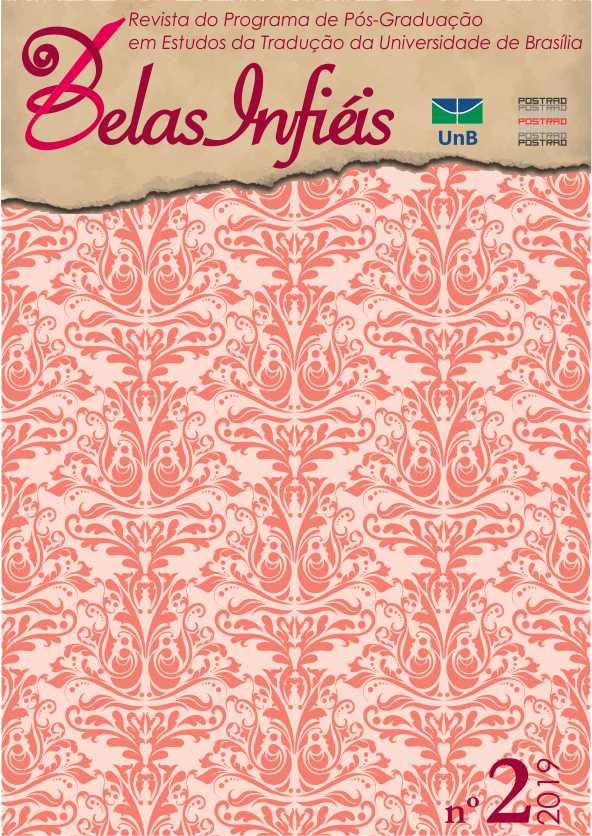Simone de Beauvoir en Argentina: el rol de las editoriales y de las traducciones en la recepción de su obra
DOI:
https://doi.org/10.26512/belasinfieis.v8.n2.2019.24372Palabras clave:
Traducciones argentinas. Mecanismos discursivos. Editoriales. Simone de Beauvoir.Resumen
El presente artículo ”” enmarcado en la traductología, el feminismo filosófico y la teoría de género ”” trata sobre la amplia y rápida difusión de la influyente obra de Simone de Beauvoir en la cultura argentina de los años 50 y de los 70 con proyección a toda América Latina y España, gracias a la labor de numerosas editoriales radicadas en Buenos Aires, que emprendieron la tarea de traducción con intelectuales de renombre (CORBÍ SÁEZ, 2010, p.77). El análisis de las traducciones habilita a plantear cuestiones concomitantes a la recepción teórico-conceptual y a las fluctuaciones de sentido del léxico, por cuestiones epocales (FOUCAULT, 1992, p.128-129). Para el desarrollo de tales temáticas, este trabajo presenta, por un lado, una revisión de los casos significativos de terminología y sintaxis en Le deuxième sexe (1949), obra fundamental y vigente en el ámbito de los Estudios de Género. Al respecto, se seleccionaron casos con mecanismos discursivos que dan cuenta tanto de la presencia del sexo-género femenino como de su opacamiento, que fueron analizados desde un enfoque traductológico, contrastando la obra original en francés y la primera traducción de Pablo Palant (1954) de El segundo sexo. Por otro lado, se ofrece un recorrido de las otras obras de Beauvoir, sus traducciones y de quienes llevaron a cabo esa tarea, con un relevamiento exhaustivo en apéndice.
Descargas
Descargas
Publicado
Cómo citar
Número
Sección
Licencia
Copyright Statement
Given the public access to this journal, the texts are free to use but requires the recognition of the original authorship and initial publication in this journal to be properly stated.
The journal allows the use of works published for non-commercial purposes, including the right to submit the work to publicly accessible databases. Published contributions are the sole and exclusive responsibility of the author(s).
- When submitting papers to be evaluated by the Belas Infiéis journal, the author(s):
- Declare that the contents of the contributions are original and of their original creation, being entirely responsible for their content if there is an objection by third parties.
- Claim to be aware that they should not commit academic plagiarism.
- Declare that the manuscript has not been published, completely or partially, in Portuguese or another language. If it is a translation it should be submitted to the Translated Articles section.
- Declare that the manuscript is not being evaluated by other journals.
- Declare that the manuscript was not submitted to another journal simultaneously.
- Commit(s) to inform the journal of any kind of error or inaccuracy in their contribution (published, in evaluation or in editing) and to collaborate with the editors to make due corrections of the article (when in evaluation or editing) or erratum/retraction (after publication).
- Declare that there is no conflict of interest regarding the published work.
- Authorize its release if it is accepted for publication without any kind of monetary compensation.
- Agree to assign non-exclusive rights to publication to the magazine, remaining free to make their contribution available in other media as long as the publication of the first version in Belas Infiéis magazine is mentioned. They also authorize Belas Infiéis to assign their texts for reproduction in content indexers, virtual libraries and similar platforms.
- Maintain copyright and grant the journal the right of first publication, the work being licensed under theCreative Commons Attribution License.
- Is/Are allowed and encouraged to publish and distribute their work online after the editorial process, which may increase the impact and citation of the published work.
- Authorize the editorial team to make textual adjustments and to adapt the article to the publication rules, when necessary.



















